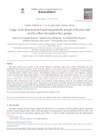Identificador persistente para citar o vincular este elemento:
https://accedacris.ulpgc.es/jspui/handle/10553/76418
| Campo DC | Valor | idioma |
|---|---|---|
| dc.contributor.author | Colmenar-Santos, Antonio | en_US |
| dc.contributor.author | León-Betancor, Andrés | en_US |
| dc.contributor.author | Diez-Suárez, Ana María | en_US |
| dc.contributor.author | González-Martínez, Alberto | en_US |
| dc.contributor.author | Rosales Asensio, Enrique | en_US |
| dc.date.accessioned | 2020-12-09T08:56:20Z | - |
| dc.date.available | 2020-12-09T08:56:20Z | - |
| dc.date.issued | 2020 | en_US |
| dc.identifier.issn | 2352-4847 | en_US |
| dc.identifier.other | Scopus | - |
| dc.identifier.uri | https://accedacris.ulpgc.es/handle/10553/76418 | - |
| dc.description.abstract | This paper focuses on an analysis of the current situation of distillation and reverse osmosis technologies and their relationship with renewable energies, to the extent that there is a strong trend in the use of distillation and reverse osmosis technologies. Large-scale seawater desalination using renewable energy is not developed, so a detailed study of the combination of renewable energy facilities, reverse osmosis, and distillation systems are needed to be effective and competitive compared to the use nonrenewable energy. Solar multiple is a very important parameter in the solar thermal industry. This is in the range of 1.5 – 3 and depends on the relationship between storage and plant power. This parameter is important because it reflects a balance between the cost of the parabolic trough collectors and the total of the solar thermal plant. If the same criterion is followed, with a thermal gap of 100 °C, chosen for the parabolic trough collectors sizing, the solar multiple in the system object of this article, has a value higher than 3. The proposed system employs renewable energies for reducing the downtime of the desalination plants, doing possible that the desalination plants being competitive in sites with poor quality solar radiation. | en_US |
| dc.language | eng | en_US |
| dc.relation.ispartof | Energy Reports | en_US |
| dc.source | Energy Reports [EISSN 2352-4847], v. 6, p. 207-222, (Noviembre 2020) | en_US |
| dc.subject | 330806 Regeneración del agua | en_US |
| dc.subject | 332205 Fuentes no convencionales de energía | en_US |
| dc.subject | 3328 Procesos tecnológicos | en_US |
| dc.subject.other | Double-Effect Absorption Heat Pumps | en_US |
| dc.subject.other | Large Scale Desalination | en_US |
| dc.subject.other | Parabolic Trough Collectors | en_US |
| dc.subject.other | Reverse-Osmosis | en_US |
| dc.subject.other | Water Costs | en_US |
| dc.title | Large-scale desalination based on parabolic trough collectors and double-effect absorption heat pumps | en_US |
| dc.type | info:eu-repo/semantics/Article | en_US |
| dc.type | Article | en_US |
| dc.identifier.doi | 10.1016/j.egyr.2020.08.044 | en_US |
| dc.identifier.scopus | 85096821222 | - |
| dc.contributor.authorscopusid | 57205455081 | - |
| dc.contributor.authorscopusid | 57220088972 | - |
| dc.contributor.authorscopusid | 57194460850 | - |
| dc.contributor.authorscopusid | 56943231800 | - |
| dc.contributor.authorscopusid | 56606316400 | - |
| dc.identifier.eissn | 2352-4847 | - |
| dc.description.lastpage | 222 | en_US |
| dc.description.firstpage | 207 | en_US |
| dc.relation.volume | 6 | en_US |
| dc.investigacion | Ingeniería y Arquitectura | en_US |
| dc.type2 | Artículo | en_US |
| dc.description.numberofpages | 15 | en_US |
| dc.utils.revision | Sí | en_US |
| dc.date.coverdate | Noviembre 2020 | en_US |
| dc.identifier.ulpgc | Sí | en_US |
| dc.contributor.buulpgc | BU-ING | en_US |
| dc.description.sjr | 1,199 | |
| dc.description.jcr | 6,87 | |
| dc.description.sjrq | Q1 | |
| dc.description.jcrq | Q1 | |
| dc.description.scie | SCIE | |
| item.grantfulltext | open | - |
| item.fulltext | Con texto completo | - |
| crisitem.author.dept | GIR Group for the Research on Renewable Energy Systems | - |
| crisitem.author.dept | Departamento de Ingeniería Eléctrica | - |
| crisitem.author.orcid | 0000-0003-4112-5259 | - |
| crisitem.author.parentorg | Departamento de Ingeniería Mecánica | - |
| crisitem.author.fullName | Rosales Asensio, Enrique | - |
| Colección: | Artículos | |
Citas SCOPUSTM
6
actualizado el 08-jun-2025
Citas de WEB OF SCIENCETM
Citations
6
actualizado el 22-feb-2026
Visitas
68
actualizado el 10-ene-2026
Descargas
61
actualizado el 10-ene-2026
Google ScholarTM
Verifica
Altmetric
Comparte
Exporta metadatos
Los elementos en ULPGC accedaCRIS están protegidos por derechos de autor con todos los derechos reservados, a menos que se indique lo contrario.
